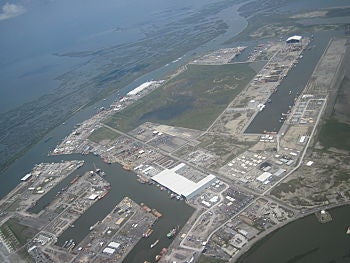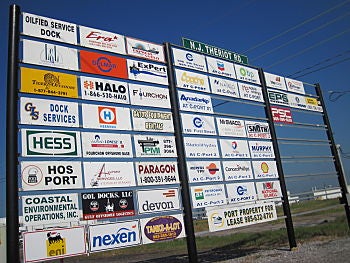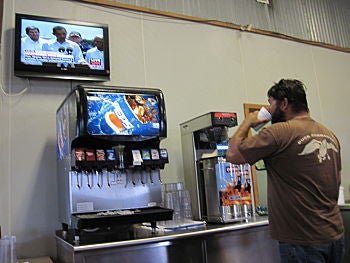
La página que intenta visitar sólo está disponible en inglés. ¡Disculpa!
The page you are about to visit is currently only available in English. Sorry!


Port Fourchon is a jarring feature along the central Louisiana coast, the underbelly of an industry that literally fuels the nation. (Photo by Justin Nobel/Audubon Magazine; flight provided by SouthWings)
Port Fourchon, Louisiana, May 30
A man named Bedrock is shoveling fish sticks into his mouth but when I ask if working oil rigs is dangerous he stops mid-chew and tells me a story. A kid right out of high school got a job on the rig floor because his dad was a manager. His task was controlling a massive wrench suspended by cables that was used to bust pipe. The first day on the job the kid failed to clamp the pipe correctly; the wrench slipped and slammed him in the head. “He was dead,” says Bedrock.
I’m talking to a group of truckers in a cafeteria in Port Fourchon, a city of heliports and ship sheds where barges and 18-wheelers unload goods and choppers and offshore supply vessels carry them out to the rigs. “Every widget and gadget needed to support the oil and gas industry is handled as cargo,” explains the Port Fourchon website, from drilling mud and cement to food and garbage. Nearly 20 percent of the country’s oil comes through the port. It is the underbelly of an industry that literally fuels the nation, and yet few people even know it exists. With Obama in town last Friday, I decided to park myself at a Fourchon truck stop and see what the place was all about.
On a wood porch overlooking the pumps, I meet Harry Reed, a thin man in a Dale Earnhardt cap who has just hauled 39,000 pounds of pipe casing from Houston. He has been making this run for years, much of the casing lining the Deepwater Horizon pipe now gushing oil into the Gulf once sat in a stack on the bed of Harry's truck. A swarm of SUVs and motorcycles with flashing blue sirens rolls into the gas station, part of Obama’s motorcade. Cops fuel up, smoke cigarettes then go in for lunch. “It’s a big thing for us down here,” says Harry, watching the show. Other local spectators include a pair of truckers eating personal pizzas and guzzling Mountain Dews and an obese man in a paint-splattered shirt who is downing Budweiser from a bottle hidden in a brown bag.
After the cops leave I duck into the cafeteria, a vast L-shaped space with concrete floors. On TV, Wolf Blitzer is showing video of the riser leaking crude. I approach a man in a Red Sox cap and ask him about life in Port Fourchon. “I ain’t saying nothing,” he says. I find a talker in a wiry young man with a goatee and glassy blue eyes who works at the fuel docks. “We still workin,” he says. But after work the man used to fish, now he no longer can. Doesn’t that make you mad, I ask. “I work in an oil field, so you can’t get mad, that’d be hypocritical,” he says. "It's an American thing, we're hungry for oil."

Port Fourchon is home to everyone whose anyone in the oil industry. (Photo by Justin Nobel/Audubon Magazine)
The lunch crowd is filing in, coarse men in grease-stained blue uniforms with names stitched across their chests and American flags woven onto their shoulders. Others wear tight jeans with Bluetooths clipped below baseball caps, these are the truckers. I sit down with two who have just hauled in pipe from Morgan City, Toothpick and Little Rookie (their CB names). They are watching CNN, which is now showing footage of orange blobs of oil suspended below the sea. Obama is due on any minute.
“Now the whole gulf is probably F---ed up,” says Toothpick. “At least for my life time.”
“Hurricane seasons fixing to start up end of next month, hopefully they clean this up or that’s gonna be some s--t,” says Little Rookie.
“That’s another thing,” adds Little Rookie. “They mess around with permits and all that s--t to okay it, well let’s okay it now, permit later!”
“Exactly!” says Toothpick.
“Damn right you can blame the government because of this s--t,” says Little Rookie. “Wait too damn long.”
“Exactly!” says Toothpick. “That’s ridiculous.”
“Ridiculous ain’t the word,” says Little Rookie. “It’s a crock of s--t.”
A tanned man with bulging muscles slaps down a tray of grub. This is Bedrock, a trucker Toothpick met on a run last week. He forks in rice and sausage and tells me about his days working the rigs. Bedrock was the derrick man, a job which entailed standing on a thin metal rail 100 feet above the rig floor with nothing holding him in but a cable and a safety belt. He unloaded 1,000-pound pieces of pipe as it came out of the well, working 12 hour shifts; he got paid 17$ an hour. One day in the middle of a shift, he quit. Why, I ask. “I got mad,” says Bedrock.
Ninety minutes late, President Obama finally comes on. The TV is turned up and several waitresses stop serving and stand and watch. Even Bedrock drops his fork and looks up. The President is in a white collared shirt, speaking at the Coast Guard station in Grand Isle, a beach town just down the road from Port Fourchon. “I give people in this community and the entire Gulf my word,” says Obama. “We are going to do whatever it takes, for as long as it takes…”
Towards the end of the short speech he mentions, for the third time, that local folks can get updates and seek help by logging onto Whitehouse.gov. I ask Bedrock if he has email. He doesn’t.
Justin Nobel/Audubon Magazine. (Flight for aerial photos provided by SouthWings)

A worker watches President Obama speak as he takes lunch at a large truck stop cafeteria in Port Fourchon. (Photo by Justin Nobel/Audubon Magazine)